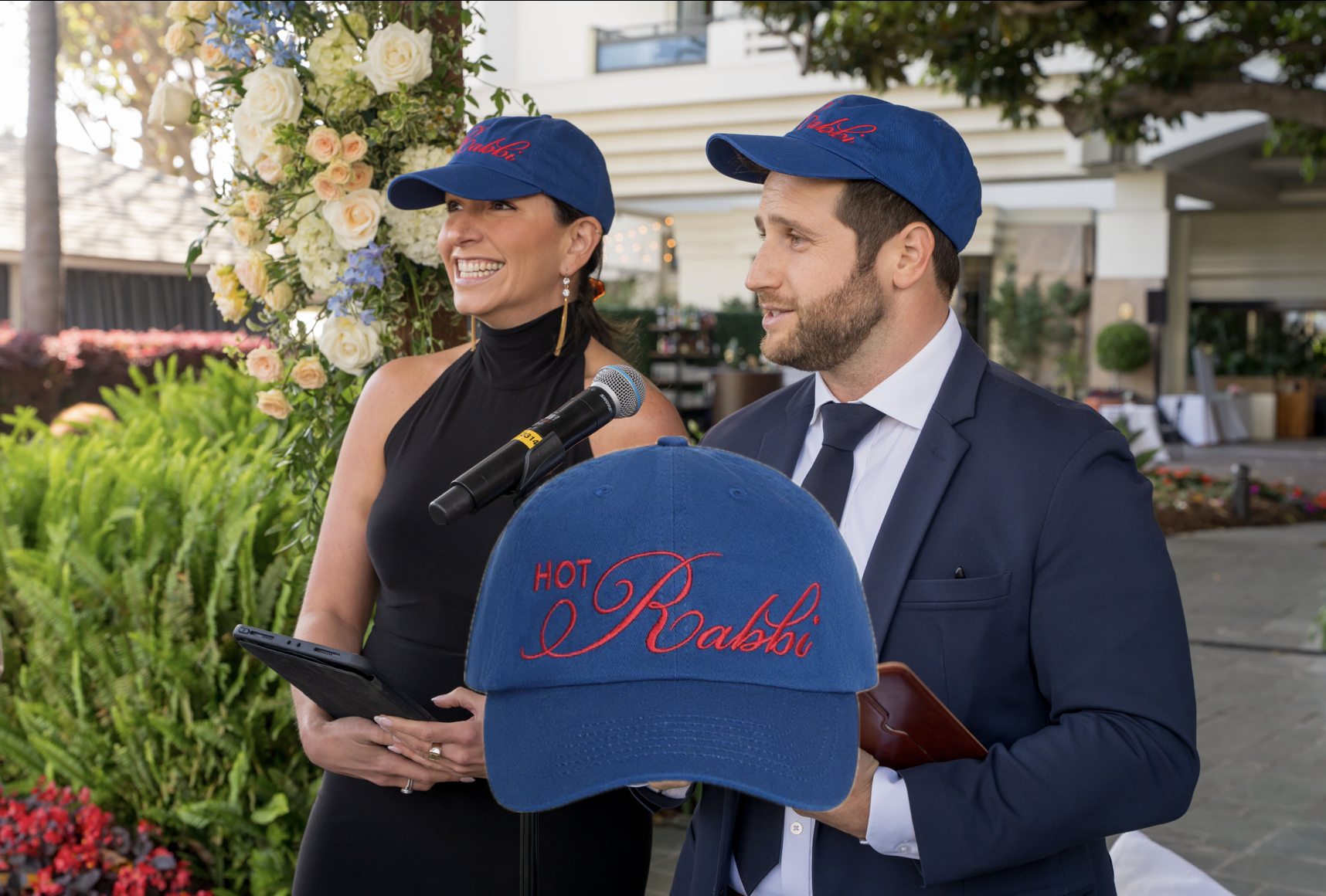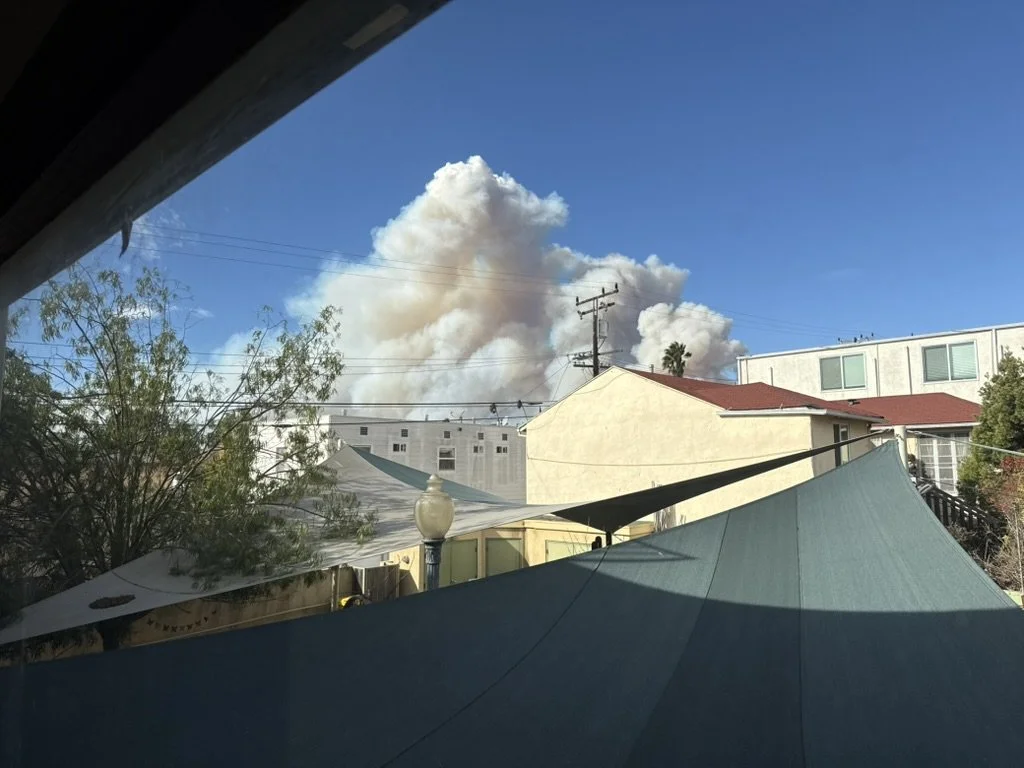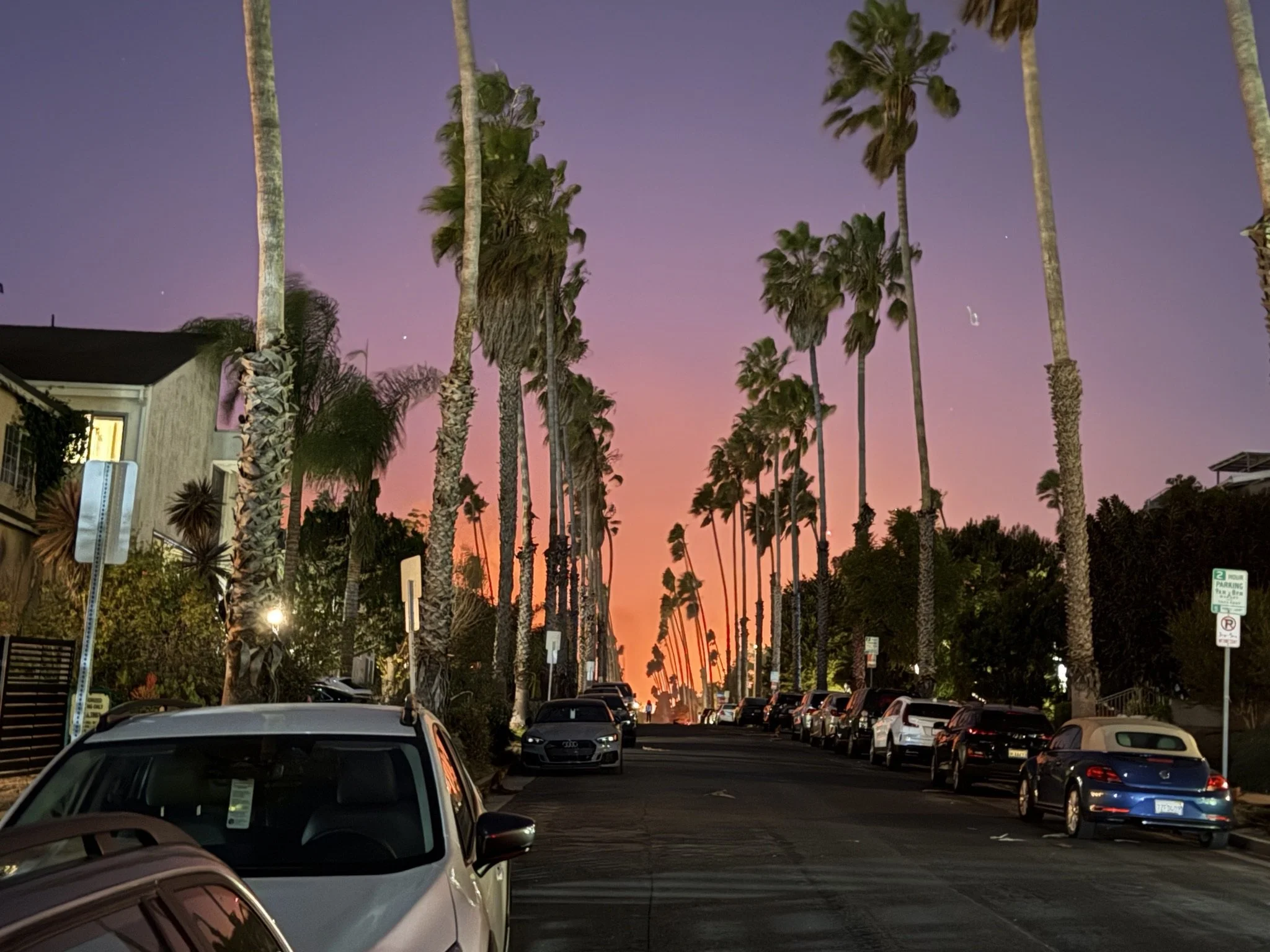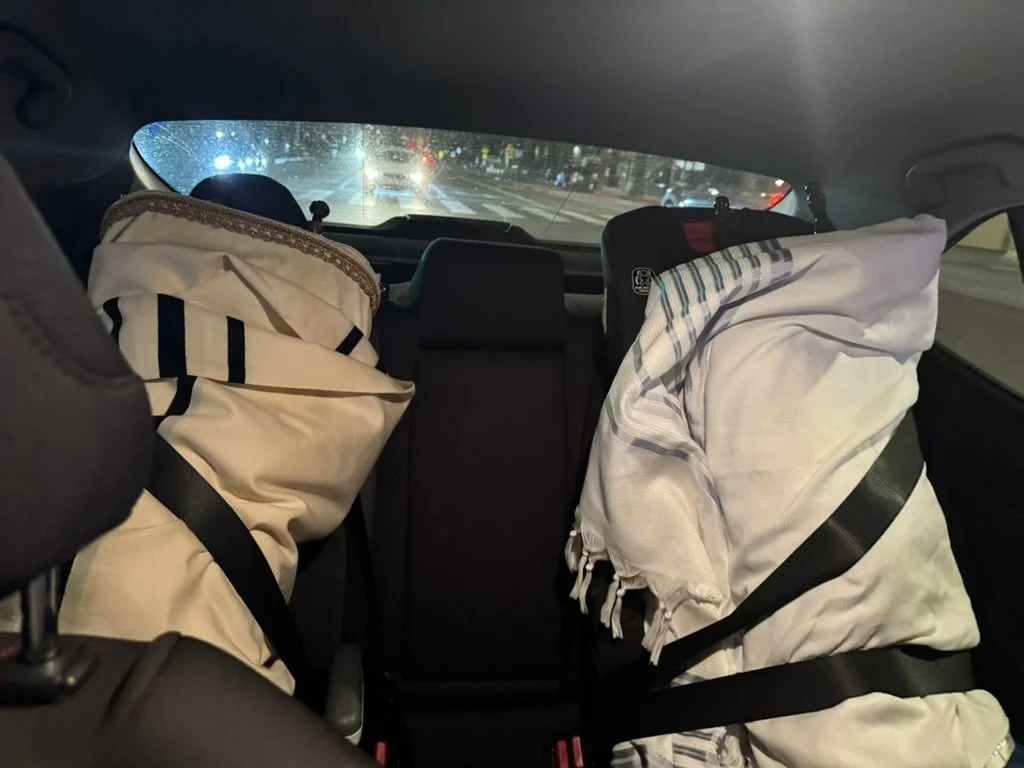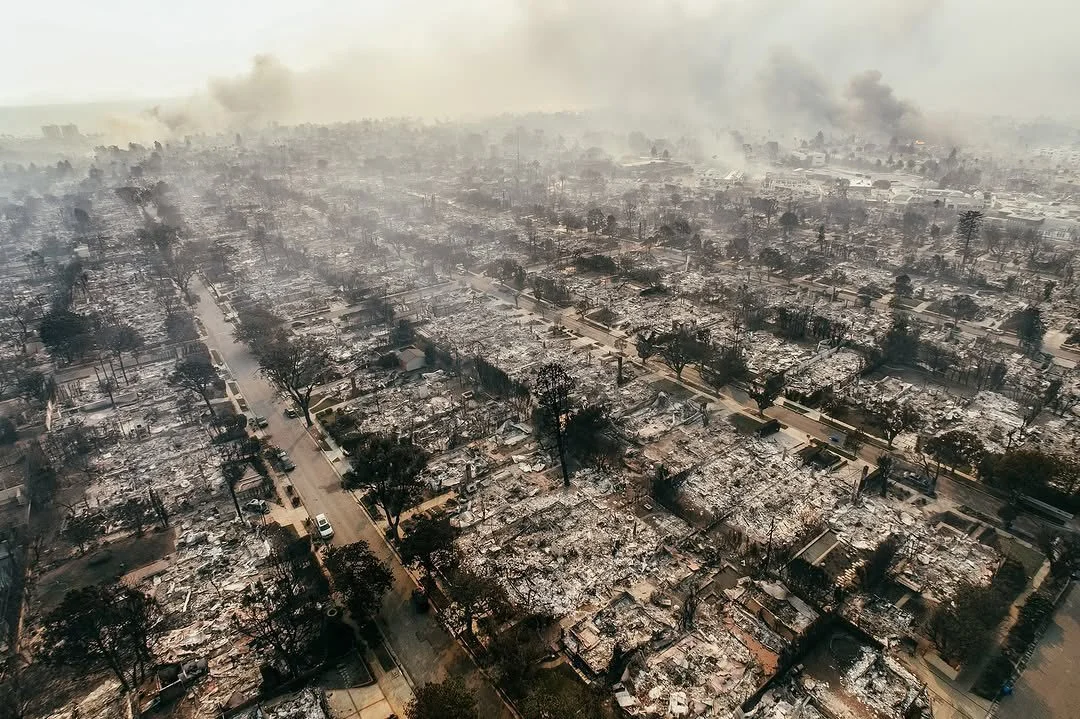On Anxiety & Hope
Every other Tuesday, I have a chevruta with two of my closest friends and colleagues—the two who married Maili & me in June: Rabbi Joanne Loiben at Temple Beth Sholom in Miami Beach and Rabbi Daniel Sher at KI in the Palisades.
On the morning of January 7, 2025, we had our first scheduled Zoom after winter break. We were texting back and forth, trying to align, if only to say hi. Daniel was off at our local Reform Rabbis Conference in Palm Springs, but we agreed to at least check in. After a quick call around 10:30, we hung up. The first reports of the fire were just coming in, and we had no idea how our lives were about to change.
Around 11am, I got an email from the Community Security Initiative at the Federation about a brush fire in the Palisades. I sent a screen shot to Daniel. “It’s bad, he responded. “Potential evacuation.” Potential. Evacuation. How little we knew.
Shortly after, as I was walking the hallway from my office to the lobby, my phone rang. Daniel again: KI was evacuating. I quickly walked up the stairs, looked out the window, and saw plumes of smoke rising alarmingly close to us.
The day became a blur of helplessness and uncertainty. When I left the synagogue, you could see the fire at the end of 19th street. Later that evening, as things worsened, I hustled back to the synagogue to get our Torahs, our community’s most precious possessions. By the time I woke up the next day, Los Angeles was forever changed.
The next few weeks were filled with heartbreak and adrenaline. Every morning I woke up with the weight of anxiety in my chest, in my lower back. As I checked in with those whose homes were lost, those whose parents had lost their home, those who lost their childhood home, those who were displaced, those who lost their community – you could feel the anxiety in conversations, in hugs, even in prayer; it lingered like the smoke itself. A couple weeks after the fires, my daughter drew this picture: a car on a road leading away from flames. A speech bubble coming out of the car: “I thought we were going to die.”
When you see your child reflect the world’s pain in such a tangible way, it crushes you. I knew my internalized anxiety turned into physical aches. What would it do to my 8 year old? And not to focus too much on Aria but, she’s dealt with a lot in her 8 years: a dad with cancer; her parents’ divorce; feeling the stress of October 7th, the war in Israel, & not feeling safe without guards everywhere she goes; and then, this fire. Living in a broken world is not easy; parenting in it often feels impossible. How do we deal with the anxieties of life - and how do we teach our children to deal with them?
Three months after the fire, Daniel and I were at the Reform Rabbis Convention in Chicago when our teacher, Rabbi Michael Marmur, attempted to answer that question for a room of anxious rabbis. He framed his teaching in a simple, childlike way that resonated deeply with us rabbis after a traumatizing few years.
We’re going on a bear hunt
We’re going to catch a big one
What a beautiful day
We’re not scared
Uh Oh!
Grass - River - Mud - Forest - A Cave
We can’t go over it
We can’t go under it
We’ve got to go through it
This classic children’s story – that was published the year I was born – is, it turns out, deeply Jewish in its wisdom. And perhaps not surprising, the author Michael Rosen is Jewish. We can’t avoid the hard parts of life, and we can’t perfectly shield our children from them either. We have to face them, name them, and walk through them together.
Before going on, I want to acknowledge, as Rabbi Marmur did in his talk, that I am no clinician. There are many people in this room who could speak with authority on anxiety. I want to speak on anxiety as I experience it, and in the way that our texts talk about it.
In Hebrew, there are a few words used for anxiety, perhaps indicating how hard it has always been to define:
Common Parlance in modern Hebrew is חֲרָדָה from Genesis 27:33
“Isaac was seized with very violent trembling” - וַיֶּחֱרַ֨ד יִצְחָ֣ק חֲרָדָה֮ גְּדֹלָ֣ה
When he realized he was tricked by Jacob
Another: דְּאָגָה
Proverbs 12:25: If there is anxiety (דְּאָגָה) in one’s mind let them quash it, And turn it into joy with a good word.
Sometimes even, פַּחַד - which is usually translated as fear
Proverbs 28:14 uses that last word:
אַשְׁרֵ֣י אָ֭דָם מְפַחֵ֣ד תָּמִ֑יד
Happy is the person who is anxious always
וּמַקְשֶׁ֥ה לִ֝בּ֗וֹ יִפּ֥וֹל בְּרָעָֽה
but whoever hardens their heart falls into trouble.”
We are blessed – and I mean that genuinely – to have a tradition that refuses to ignore anxiety. In the Talmud, how we deal with that anxiety might be up for debate: Rabbi Amei, echoing Proverbs 12, says anxiety is something to be quashed: “You should forcefully push it [yasḥena] out of your mind,” he advises. Rabbi Asi says: You should tell [yesiḥena] others your concerns, which will lower your anxiety.
Though I personally prefer the latter suggestion, more important is that our tradition acknowledges anxiety. We name it out loud, give it language - at least three Hebrew words, and among other Yiddish words, the wonderfully accurate shpilkes (nervous energy); and even allow that anxiety can be a source of wisdom.
In fact, Rabbi Marmur argues, “there would have been no Jewish thought…were it not for an acknowledgment of anxiety. If everything is going fantastically well, you might write psalms or praise. You will not write works of thought and spiritual depth, which are designed to struggle with one's core anxieties.”
To feel anxious, our tradition suggests, is not a flaw, but a sign of life. The 19th century Rabbi & commentator Malbim, taught that: “Anxiety is [actually] a spiritual strength, for it represents concern for the future.”
And for those of us who have felt anxiety acutely over the past few years – in particular about the future of our country, the future of Israel, the future of Judaism, the future of our own lives and the lives of our children & grandchildren – our tradition can guide us in dealing with that anxiety and respond honestly, generatively, creatively, in a way that helps us and strengthens our community.
And on a day in which we lay ourselves bare to God and seek spiritual strength and clarity, I want to start by articulating my anxieties.
As Rabbi Marmur reminded us before listing his own anxieties, people don’t usually thank you for naming your anxieties—especially not your rabbi. Either you agree, and they’re mundane. Or you disagree, and they’re outrageous.
To be frank, some of these anxieties are hard to say out loud, and they may be hard to hear. But I believe deeply that continuing to avoid our anxieties – to go over them, to go under them, to do anything but go through them – will not serve us in the long term.
And so, let me be honest:
I have an anxiety about even sharing my anxieties. That anything I say as your rabbi might be heard as the wrong thing—and in today’s world, the wrong thing can be enough to make someone walk away from the community.
I have an anxiety that the culture of moral purity and ideological extremism, of “gotcha culture” and social media permanence, leaves us no space to be human, no space to make mistakes, no space to have texture, no space to exist in the gray area.
I have an anxiety about losing my parents, and for that matter, leaving my wife & kids too soon. And as a cancer survivor, I carry the fear of dying young and the Tfear of cancer returning.
I have an anxiety about the world we are leaving for our children—that we are not responding urgently enough to the climate crisis, and that they will pay the price of our delay.
I have an anxiety that the American Experiment is unraveling—that democracy itself is slipping from our grasp, that our institutions are being undermined and usurped; that minorities – Jews included – have become unsafe here, that our government is run for the powerful instead of the people.
I have an anxiety that we are again defining our Jewish identity through a lens of antisemitism, and that it is being manipulated for political gain in ways that make us even less safe and drive wedges between Jewish communities.
I have an anxiety that Israel is losing its founding vision [and I quote] as a “country for the benefit of all its inhabitants…based on freedom, justice and peace as envisaged by the prophets of Israel.”
I have an anxiety that the delicate balance of Jewish and democratic will buckle and ultimately give out under the weight of Jewish extremists.
I have an anxiety about the normalization of violence; that mass shootings, wars, and the suffering of others no longer moves us, and that that numbness will corrode our souls.
I have an anxiety that we no longer believe in the possibility of peace; that we are resigned to conflict as our fate, that daring to imagine another way labels you naive or self-hating.
And I have an anxiety that we prefer avoidance—that we’d rather go over our problems, or under them, or around them—anything but through them.
I could go on, but I will spare you – I feel the shpilkes in the room. But I encourage you to articulate your anxieties, too. And once you do, what do we do with this list?
The answer, I believe, is that by acknowledging them honestly and vulnerably we propel ourselves toward a hopeful future. Not a naïve hopefulness, but the kind our tradition insists on – is built on – the kind that grows even out of ashes and carries us to new beginnings.
It is the hope that reimagined Judaism after the destruction of the Second Temple; the hope embedded in the hearts of Jews expelled from France, England, Spain, and Portugal, who carried their tradition into new lands and reestablished their lives. It is the hope that carried a generation fleeing pogroms across the ocean to America, where they built new lives and new communities; and it is the hope that stirred in Theodor Herzl of a Jewish state in the face of persistent antisemitism.
The philosopher Erich Fromm writes that, “To hope means to be ready at every moment for that which is not yet born.” Hope is not passive waiting or forcing the impossible. It is staying attuned to the possibility of new life and being ready to nurture it.
By acknowledging our anxieties, we open our eyes and hearts to the possibility of “that which is ready to be born.” We unburden ourselves of the need to pretend that everything is fine, and instead make space for something new to emerge out of what is broken.
In the days & weeks after the fire, we lived out this type of hope, the kind of hope that transforms trauma into opportunity. When KI needed a home for their preschool, we didn’t hesitate. We opened our doors. Our classrooms became their classrooms, our hallways filled with the voices of both communities’ children; Tuesday evenings have a full building of joint teen programs; in April our 8th graders will lead our communities in our Yom HaShoah observance together. Our sanctuary has hosted KI BMitzvah celebrations at least once a month. And on Friday, a brand new Sukkah will be built for the first time to host both communities' Sukkot events. What began as our deepest anxieties being realized and new ones emerging, turned into partnership and collaborative community that lifted everyone up.
And here at Beth Shir Shalom, that same hopeful spirit is shaping our future. With the help of Paul Diamond, our VP of Facilities and our unbelievable Executive Director, Cynthia Barzilai, we’ve accomplished so much: we’ve refloored & repainted the interior of our building; we’ve renovated our main office & filled it with three, new full-time staff. We’ve installed new streaming equipment, expanded our preschool, dedicated space to our growing AfterShul program, and we are almost finished with Hope Corner along 19th street & a new Toddler Yard so even more children and families can find their Jewish home with us. It’s worth saying, without the friendship, and partnership with KI that we’ve fostered in these months – without relinquishing that anxiety that if we help each other we hurt ourselves – we could not have accomplished so much, so quickly.
But our vision doesn’t stop there. Our board completed a strategic plan last year that dreams of Beth Shir Shalom as a true center of Jewish life on the Westside. And, Daniel and I continue to dream collaboratively about what’s possible west of the 405: a Jewish Cultural Center for concerts, lectures, podcast recordings and book events; a third-place Coffee House for connection and study with Jewish foods and celebrations; a mikveh to make our beautiful ancient rituals convenient and welcome new Jews to the tribe. Heck, maybe even a shvitz!
That is what happens when we face the valley of deep darkness, the valley of anxiety, the valley of death and destruction together: anxiety loosens its grip on us and resilience becomes possible, hope becomes inevitable, and our dreams of a brighter future come into focus.
Psalm 23 teaches us: “Though I walk through the valley of the shadow of death, I will fear no evil, for You are with me.” Though I WALK – not wallow in, not stand in for a while. We walk through—together, and when we are together, God is at our side.
We cannot avoid our fears, our uncertainty, our anxieties. But we can refuse to face them alone. We can walk through the valley together. And when we do, we’ll discover that even in the shadows there are green shoots of life waiting to be born - perhaps from the tiny seeds we’ve planted.
I love you, I am here for you, and together, we will overcome our anxieties and build the redeemed future of our dreams.
G’mar Chatimah Tovah!
